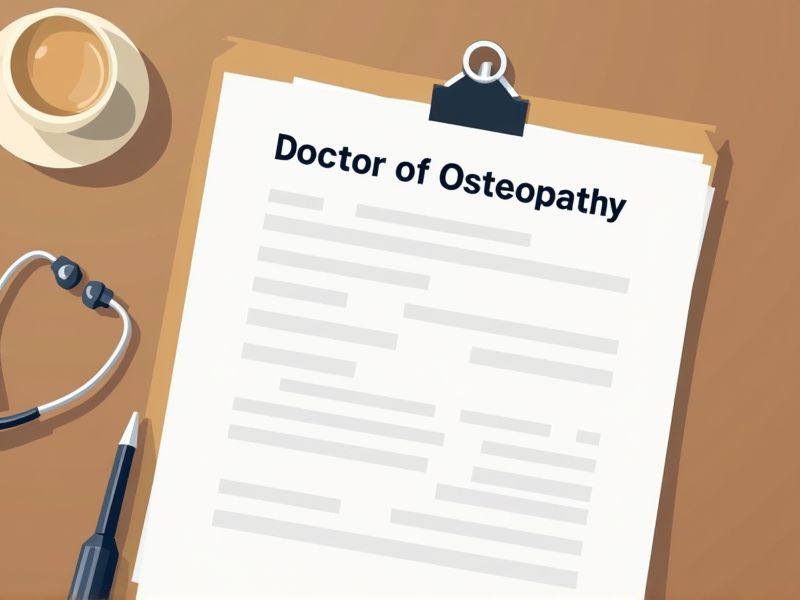
Doctor of Osteopathy practitioners often pursue specific certifications to enhance their skill sets and broaden their scope of practice. These certifications are essential because they provide specialized knowledge that improves patient outcomes and ensures compliance with medical standards. As the healthcare landscape evolves, possessing these credentials can increase a DO's competitiveness in their field. Key certifications essential for a Doctor of Osteopathy include the following.
American Osteopathic Board of Family Physicians Certification
Obtaining the American Osteopathic Board of Family Physicians Certification ensures a Doctor of Osteopathy meets rigorous standards in family medicine, enhancing the trust of both patients and peers. This certification validates a DO's specialized knowledge and skills, promoting higher quality care. It also increases career opportunities and potential for higher earnings by distinguishing them in a competitive job market. Certification mandates continuous education, ensuring professionals stay updated with the latest advancements in medical practice.
American Osteopathic Board of Internal Medicine Certification
Obtaining certification from the American Osteopathic Board of Internal Medicine enhances a Doctor of Osteopathy's credibility in the medical community. This certification validates the physician's expertise and specialized knowledge in internal medicine, leading to increased trust among patients and peers. The certification process often involves rigorous training and examinations, contributing to improved clinical skills and patient care outcomes. Board-certified DOs typically have better career opportunities and may enjoy higher earning potential due to recognized proficiency in their field.
American Osteopathic Board of Emergency Medicine Certification
American Osteopathic Board of Emergency Medicine Certification is needed to demonstrate specialized expertise in emergency medicine for osteopathic doctors. It enhances career prospects by aligning DOs with standardized competency in the field. Holding this certification often leads to increased professional credibility and trust among patients and peers. Hospitals and healthcare organizations may require or prefer board certification for certain employment opportunities or advancement.
American Osteopathic Board of Pediatrics Certification
The American Osteopathic Board of Pediatrics Certification ensures that a Doctor of Osteopathy has met specific competency standards within pediatric medicine, establishing credibility and trust with patients and peers. Certification enhances the professional reputation of DOs, often leading to increased job opportunities and potential for career advancement. It indicates a commitment to ongoing education and improvement, which is crucial in a constantly evolving medical field. Obtaining this certification can also result in better insurance reimbursements and inclusion in more healthcare networks.
American Osteopathic Board of Neurology and Psychiatry Certification
The American Osteopathic Board of Neurology and Psychiatry Certification validates a Doctor of Osteopathy's expertise and specialized knowledge in neurology and psychiatry. This certification enhances the credibility and trust of the physician in patients' eyes, often leading to better patient engagement and outcomes. Without it, DOs may face limitations in career advancement and hospital privileges, as many institutions require board certification for certain positions. The certification process encourages continuous learning, keeping practitioners abreast of the latest developments and practices in the field.
Osteopathic Manipulative Medicine Certification
Osteopathic Manipulative Medicine (OMM) certification ensures Doctors of Osteopathy maintain high standards in manual treatment techniques. Certification helps DOs validate their skills and expertise, fostering patient trust and improving care delivery. Employers often seek certified professionals as they are likely more proficient in OMM practices. OMM certification provides a structured pathway for continuous professional development within osteopathic healthcare.
Advanced Cardiac Life Support Certification
The Advanced Cardiac Life Support (ACLS) certification equips a Doctor of Osteopathy (DO) with critical skills to manage cardiac emergencies effectively. Data shows that ACLS training improves patient survival rates during cardiac arrest by ensuring timely and proper intervention. A DO frequently encounters patients with cardiovascular issues; mastery of ACLS protocols enhances the quality of care provided. Hospitals and healthcare institutions often require ACLS certification to meet their accreditation standards and ensure all medical staff are proficient in handling life-threatening situations.
Basic Life Support Certification
Basic Life Support (BLS) certification ensures that a Doctor of Osteopathy is equipped to provide immediate care during life-threatening emergencies. This skill set directly improves patient survival rates in critical situations. Hospitals and clinics often require BLS certification as part of their credentialing processes for medical staff. Staying certified in BLS helps maintain a doctor's competency in handling cardiac arrest, choking, and drowning incidents.
Pediatric Advanced Life Support Certification
Pediatric Advanced Life Support (PALS) Certification equips Doctors of Osteopathy with critical skills to effectively respond to emergencies involving infants and children. Proficiency in PALS protocols improves diagnostic accuracy and treatment in life-threatening pediatric situations. This certification ensures adherence to the latest medical guidelines, enhancing patient care quality. Hospitals and clinics prioritize hiring practitioners with PALS, reflecting its importance in comprehensive pediatric medical services.
HIPAA Compliance Certification
HIPAA Compliance Certification ensures a Doctor of Osteopathy adheres to federal laws safeguarding patient health information, reducing the risk of data breaches. This certification demonstrates a commitment to protecting patient privacy and can enhance patient trust, which is crucial for maintaining patient relationships. Training in HIPAA compliance allows the osteopathic doctor to implement best practices for managing sensitive health records, thus promoting effective and secure healthcare delivery. Non-compliance can lead to significant legal penalties and loss of reputation, impacting the doctor's ability to practice effectively.
Summary
When you pursue additional certifications as a Doctor of Osteopathy, your expertise and skill set broaden significantly. This expanded knowledge can enhance your credibility in the medical field, potentially leading to increased patient trust. With these credentials, opportunities for specialized roles or leadership positions might arise. Patients might also benefit from a wider range of treatments and therapeutic approaches offered under your care.
